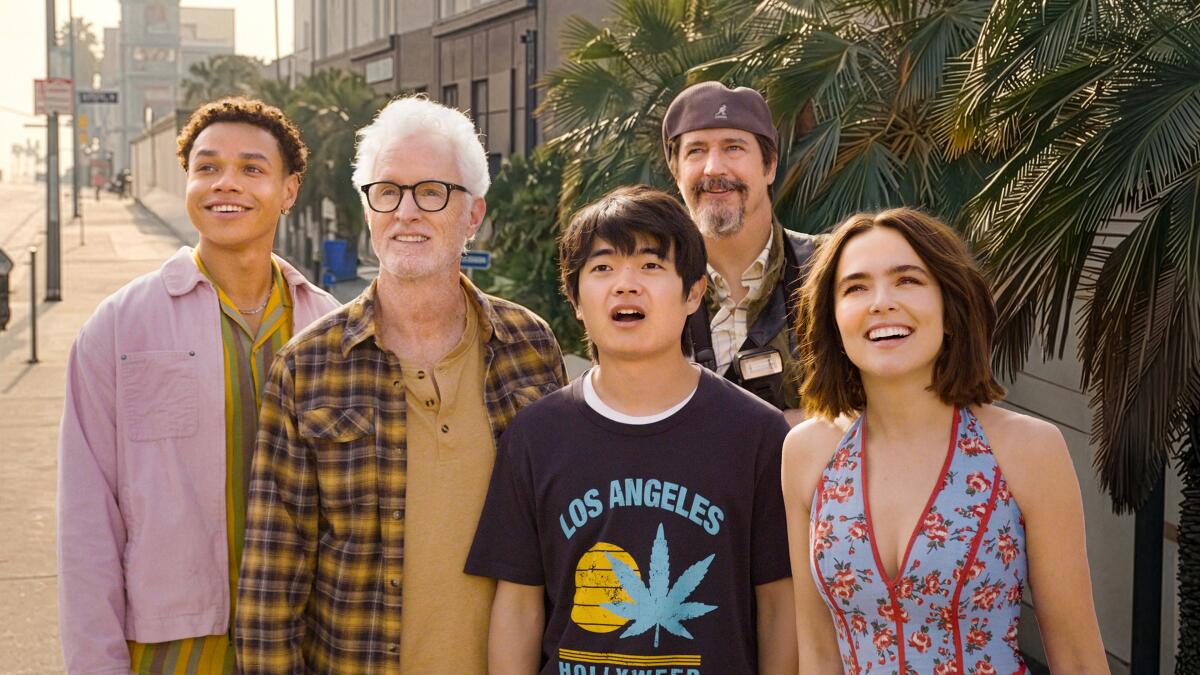Sundance 2026: ‘The Invite’ and ‘Gail Daughtry’ lure with sex and laughs
PARK CITY, Utah — Welcome to a special Sundance Daily edition of the Wide Shot, a newsletter about the business of entertainment. Sign up here to get it in your inbox.
Good evening — it’s Monday, Jan. 26, and you’re reading the last of our Sundance dispatches. Today we’ve seen a high of 36 degrees on a notably sunny day. We waited and waited for deal news, but it hasn’t quite arrived yet.
We’re hearing about distributors circling both Olivia Wilde’s “The Invite” and the provocative “Josephine,” the latter of which is coalescing into a critical favorite at the fest.
We’ve been speaking the last few days with a parade of fascinating stars and directors: Ethan Hawke, Salman Rushdie, the legendary Billie Jean King, Brittney Griner, many more. Check out our videos right here as we make them live.
Mark Olsen spoke with director NB Mager about her debut feature “Run Amok,” which premiered at the festival today. Here are some recommendations for you.
What we’re watching today
“Gail Daughtry and the Celebrity Sex Pass”

Miles Gutierrez-Riley, John Slattery, Ken Marino, Zoey Deutch and Ben Wang in the movie “Gail Daughtry and the Celebrity Sex Pass.”
(Sundance Institute)
Twenty-five years ago, the Sundance premiere of David Wain’s “Wet Hot American Summer” reignited the ’80s-style sex romp. Now he’s returned to Park City to see if he can rescue the comedy again.
“Gail Daughtry and the Celebrity Sex Pass” stars Zoey Deutch as a Kansas hairdresser whose fiancé cheats on her with his “hall pass”: a get-out-of-the-doghouse-free exemption for canoodling with his movie-star crush. (I’ll let you discover that cameo yourself.)
To even the score, Gail travels to Los Angeles to sleep with her own idol, Jon Hamm, and is soon skipping down Hollywood Boulevard with a ragtag group of new friends, including “Mad Men’s” John Slattery as himself. There’s a sensitive indie way to tell this story — and then there’s Wain’s giddy lampoon of “The Wizard of Oz.”
Too many modern comedies are jokeless anxiety attacks. I just wanna laugh. I need to laugh. If you need to laugh, this is your hall pass to get slap-happy. — Amy Nicholson
“Chasing Summer”

Iliza Shlesinger stars in the movie “Chasing Summer.”
(Eric Branco / Summer 2001 LLC / Sundance Institute)
Comedian Iliza Shlesinger writes and stars in “Chasing Summer,” directed by Josephine Decker. Having recently lost her job and her boyfriend at the same time, Jamie (Shlesinger) returns to her parents’ house in the small Texas town where she grew up.
As she falls back into some of the same social dynamics from when she was a teenager, possibly rekindling an old flame (Tom Welling), Jamie also enjoys an affair with a much-younger man (Garrett Wareing).
Though Schlesinger’s bawdy humor and Decker’s explorations of female interiority in films such as “Shirley” and “Madeline’s Madeline” (both played at Sundance) might make for an unexpected collaboration, it’s a surprisingly good match. Funny and insightful, the movie shows that sometimes you can in fact go home again. — Mark Olsen
The sexy ‘Sundance tribute’ in ‘Gail Daughtry’
Having the world premiere of “Gail Daughtry and the Celebrity Sex Pass” at Sundance was a full-circle moment of sorts for director and co-writer David Wain. His first introduction to the festival was Steven Soderbergh’s hall of famer “sex, lies and videotape,” and Wain noted after the well-received premiere of his new film that he “overtly stole” two sex scenes from that indie classic as “a tribute to Sundance.”
Of course, “Gail Daughtry” is about as opposite as you can get from Soderbergh. It’s an absurdist, cameo-filled comedy proudly shot on location in L.A. that co-writer Ken Marino described before the screening as a “silly, fun romp.”
Even before its theatrical release, it already has the hallmarks of a cult classic à la another Wain and Co. film, “Wet Hot American Summer,” and features many faces from that movie as well as the State, the comedy troupe that cast member Kerri Kenney-Silver explained started in a supply closet at New York University because they couldn’t get any other rehearsal space.
“Making movies with your friends is a privilege,” cast member Joe Lo Truglio said. And with their ever-expanding circle of friends, we’re the ones who benefit. — Vanessa Franko
Some deal news
Neon has acquired the worldwide rights to horror film “4 X 4: The Event” from filmmaker Alex Ullom, the indie studio said Sunday afternoon.
The deal is the first to be made in Park City so far, though the film was not shown at Sundance and will begin production later this year. The value of the deal was not disclosed.
The film follows eight contestants who join an illegal “sensory assault” livestream in which they can only harm each other with items they can buy online, Neon said in a statement.
The studio previously bought global rights to Ullom’s first horror film, “It Ends,” after it premiered at SXSW last year. — Samantha Masunaga
